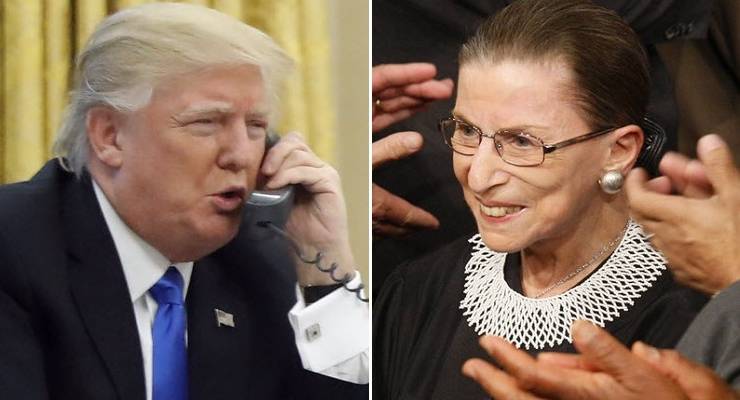
How low can American politics go? We’re about to find out.
Last Friday the inimitable Ruth Bader Ginsburg finally lost her long struggle with cancer. And immediately, the tributes to her brilliant career were drowned out by the clamour of politicians squabbling over the process of appointing her replacement to the US Supreme Court.
On paper at least, the process is straightforward. The president nominates a candidate for the vacancy, the Senate investigates the candidate, and then the Senate votes (by simple majority) on the confirmation of the candidate.
The problem is that process wasn’t followed in March 2016 when then-president Barack Obama nominated Merrick Garland to the Supreme Court to replace Justice Antonin Scalia who had died in February.
The Republican-controlled Senate declined to even consider the nomination on the grounds that it was took close to the 2016 presidential election — at that point still eight months away.
Senate Majority Leader Mitch McConnell had already made his position very clear on the day that Scalia died:
“The American people should have a voice in the selection of their next Supreme Court justice. Therefore, this vacancy should not be filled until we have a new president.”
A similar view was expressed by numerous Republicans. (See here for an exhaustive list of such self-righteous declarations.)
Given this history, surely Republicans could never entertain a nomination from President Donald Trump just six weeks before the next presidential election?
Of course they can.
Mitch McConnell, still the Senate majority leader, released a statement on the day of RBG’s death.
He said that “President Trump’s nominee will receive a vote on the floor of the United States Senate”. What happened to “the American people should have a voice in the selection of their next Supreme Court justice”?
The hypocrisy is staggering. McConnell attempted to justify the unjustifiable on a specious argument that in 2016 the Senate majority had been elected “to check and balance” a president in his second term.
Perhaps the most egregious backflip is from Senator Lindsey Graham, the Republican chair of the Senate Judiciary Committee who will oversee any confirmation hearing. In 2016 he could not have been clearer:
“I want you to use my words against me. If there’s a Republican president in 2016 and a vacancy occurs in the last year of the first term, you can say Lindsey Graham said, ‘Let’s let the next president, whoever it might be, make that nomination’.”
On Saturday Graham tweeted that he will support President Trump “in any effort to move forward regarding the recent vacancy created by the passing of Justice Ginsburg”.
These politicians have no shame.
There is already talk that if Trump’s nomination is successful, but the Democrats win the presidency and control of the Senate, they will retaliate by expanding the number of Supreme Court justices, “stacking” the court in their favour.
The sad reality is that US politics are now toxic. There is no room for compromise or co-operation. There are no mistruths that cannot be spoken; no norms or conventions that cannot be broken to achieve partisan political goals.
But there is a high price to pay for such behaviour. According to the pollster Gallup, confidence in the US Congress has declined from 42% in 1973 to just 13% in 2020.
Democracy is in trouble when citizens hold their politicians in such contempt.
There are lessons here for politicians in liberal democracies like Australia. They must resist the temptation to follow the path taken by their American counterparts. They must not sacrifice their principles for short-term political gain. Ethics matter.
Australian politicians have never been saints. But there is evidence that their standards are slipping.
In the lead-up to the 2016 federal election, the Australian Labor Party ran what came to be known as the “Mediscare” campaign. This was intended to scare voters off voting for the Coalition by making them believe that the Coalition would somehow “privatise” the Medicare system. The campaign was unquestionably dishonest.
The Coalition expressed outrage over Mediscare in the 2016 election. But rather than retain the moral high ground for the 2019 election, it chose instead to take Labor’s low road.
The result was the “death tax” scare campaign. This was intended to scare voters off voting for the ALP by making them believe that an ALP government would bring in an inheritance tax. Like Mediscare, the Coalition’s death tax campaign was fundamentally dishonest.
The politicians behind both those campaigns knew exactly what they were doing. For them, the ends justified the means. This is what “win at all costs” politics looks like. Politicians who have no shame.
Former Queensland judge Tony Fitzgerald describes them as “‘whatever it takes’ politicians driven by self-interest and ideology”.
It must be obvious to Australia’s major political parties that US politics are deeply flawed; that hyper-partisanship and the absence of a moral compass are inconsistent with a healthy democracy.
We can only hope that they have the good sense to take a different path.








That the Coalition would seek to privatise health care of every kind is a perfectly reasonable assumption to make. That they would deny it is equally predictable.
abbott introduced a co payment
As did “Labor” with higher education and hasn’t that worked out well?
Universities so dependent of fees as to be biddable.
“We can only hope that they have the good sense to take a different path.” Not a hope.
Once you see the other side as the “enemy”, not an “opponent”, anything can be justified, including (ultimately) violence.
I do take slight issue with “Mediscare” being in the same ball park as various other excesses. Plenty of governments have, after election, introduced measures which, during the campaign, they had denied they would introduce. As a voter, I’m not going to accept their assurance that they won’t; I’ll go on their past form in the policy area in question.
Turnbull had launched an expensive productivity commission study into privatisation of Medicare in February of 2016. They had palmed off responsibility for cancer patient records to Telstra in June of that same year. It was only in the days prior to the 2016 election that Turnbull FINALLY ruled out Medicare Privatisation. So it seems Labor’s campaign was solidly built on the available facts. Certainly a world away from the Coalition’s “Death Tax” & “Retirement Tax” scares during the 2019 campaign.
“The GST is dead, cremated & buried” comes to mind.
Which paragon of probity & veracity gave the electorate that non-core promise?
I’d forgotten that little gem
I hope that it is chiselled on his very-soon-to-be installed tombstone.
Anyone making book on his receiving a State funeral with all the trimmings?
I have $10 sez ‘yes’.
It’s weird how people persist in stating that ‘Mediscare’ wasn’t real. The government announces the ‘outsourcing’ of the medicare payment system, the ALP warned about the consequences of it at the election and then after the election, because of that campaign, the government abandons that effort. Sounds like it was real to me.
The point of this article is fair enough, but it really is only talking about what politicians ‘say’. I find it quite implausible that this is the cause of a massive fall in confidence in the parliament. After all, what politician’s say is only a ‘politician’s promise’ and who of sound mind would actually believe a politician’s promise? Not many I’d say. That’s why ‘plans’, ‘policy manifestos’ etc are meaningless to voters, except perhaps for the extremely gullible.
A far more believable hypothesis is that people’s’ confidence in their parliaments (& democracy) has plummeted because of what the individual members of the chambers actually do, or fail to do. In the USA this could their failure to impeach a clearly deranged and mentally incompetent president. And in Australia it could be any number of numerous failures of the state and federal legislatures; eg. members voting for laws they haven’t read, failure to hold the executive arm of government to account (notably ensuring they comply with the law, but also enabling them to hide shonky secret deals as per Crikey’s Crony Capitalism series), failure to sack incompetent/corrupt ministers.
Nothing will change while people continue to vote in individuals more committed to gaining power for their party and party’s owners/donors.